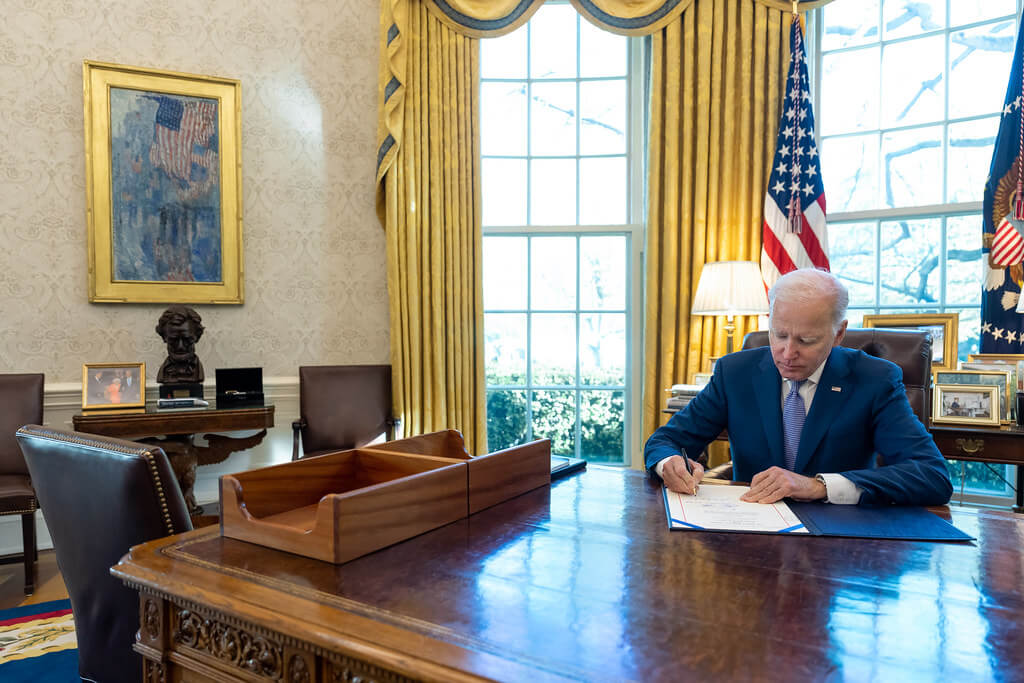Analysis: 4 things to know about Biden’s sanctions of West Bank settlers
Biden ordered financial sanctions on 4 settlers engaged in violence against Palestinians

President Joe Biden signing an executive order on April 10, 2023. Photo by Adam Schultz/White House
President Joe Biden signed an executive order Thursday to punish Israeli settlers implicated in violence against Palestinians in the occupied West Bank.
The order comes on the day Biden is visiting Michigan, home to the largest population of Arab Americans. Many accuse him of doing little to aid Palestinians suffering in Israel’s military campaign against Hamas in Gaza and at the hands of settlers in the West Bank. The United Nations Office of Humanitarian Affairs has reported that settlers, or settlers joined with Israeli forces, have killed 10 Palestinians and wounded 137 since Oct. 7.
The order allows the administration to freeze U.S. assets of settlers who have threatened Palestinians, destroyed their property, forced them out of their homes, or engaged in violence against them, and follows the administration’s December imposition of visa restrictions and a travel ban on several dozen Israeli settlers.
Israeli Prime Minister Benjamin Netanyahu’s office said in response to Thursday’s order that Israel is already taking action against those who violate the law “and therefore there is no place for drastic steps on this matter.”
Here’s what else to know about the new order.
What is Biden trying to achieve politically?
Biden has made cracking down on settler violence a priority as he faces harsh criticism from many in his party for embracing Israel and failing to support an immediate and permanent cease-fire in Gaza. In recent months sympathy for Palestinians has risen — particularly among Democrats, younger Americans and people of color — as the death toll mounts in Israel’s military campaign in Gaza, a response to Hamas’ Oct. 7 attack.
The order could help bolster flagging support for Biden among Arab Americans, some of whom have said his Middle East policies will cost him their votes in November.
Biden spoke of “the trauma, the death and destruction, in Israel and Gaza” in remarks at the annual National Prayer Breakfast in Washington, D.C., Thursday morning.
Who does the order affect?
The State Department listed four men who are immediately subject to the sanctions and laid out the actions that led to their punishment as follows:
- David Chai Chasdai, for leading a riot in the Palestinian village of Huwara that resulted in the death of a Palestinian;
- Shalom Zicherman, who videos showed attacking Israeli peace activists in the occupied West Bank;
- Yinon Levy, for repeatedly leading groups of settlers from the outpost known as Meitarim Farm to intimidate and assault Palestinians and Bedouin in hopes of forcing them off the land where they lived and farmed;
- Einan Tanjil, for assaulting Palestinians and Israeli peace activists with stones and clubs.
Axios reported that the administration had initially considered including two extremist cabinet members, Itamar Ben-Gvir and Bezalel Smotrich, on the list for their inflammatory rhetoric and defense of some settler violence.
It instead named only actual perpetrators of attacks. Including the cabinet ministers “is not something that is currently under contemplation,” a U.S. official said on Thursday morning.
How does it help Biden frame the conflict in the Middle East?
The order is an attempt to separate the Israeli-Palestinian conflict from the war against Hamas in Gaza, so that Biden can portray himself as a peacemaker in the Middle East.
He blasted settler violence in a statement Thursday as a threat to “the viability of a two-state solution.” Extremist settlers undermine, he continued, “the security of Israel and have the potential to lead to broader regional destabilization across the Middle East.”
In a briefing with reporters, senior administration officials called the order part of a “holistic approach” to the conflict in line with Biden’s commitment to two states, one Israeli and one Palestinian.
The order also puts more pressure on Israeli Prime Minister Benjamin Netanyahu’s right-wing government, while avoiding alienating Jewish Americans and supporters of Israel. Biden has reportedly grown frustrated with Netanyahu in recent weeks over his refusal to talk about resolving the Israeli-Palestinian conflict after the war.
How bad is settler violence?
Last year was the most violent year on record for settler attacks, according to a report by Israeli watchdog Yesh Din, which began monitoring incidents in 2006. At least 10 Palestinians were killed and dozens of homes were destroyed in 2023. The report noted that the violence intensified following the Oct. 7 Hamas attack on Israel, with 242 documented incidents.
JTA contributed to this report.
A message from our Publisher & CEO Rachel Fishman Feddersen

I hope you appreciated this article. Before you go, I’d like to ask you to please support the Forward’s award-winning, nonprofit journalism so that we can be prepared for whatever news 2025 brings.
At a time when other newsrooms are closing or cutting back, the Forward has removed its paywall and invested additional resources to report on the ground from Israel and around the U.S. on the impact of the war, rising antisemitism and polarized discourse.
Readers like you make it all possible. Support our work by becoming a Forward Member and connect with our journalism and your community.
— Rachel Fishman Feddersen, Publisher and CEO


























